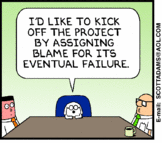
02 Nov Project Failure – Avoid These Three Common Pitfalls

We all start projects with the best intentions. Sometimes we experience so much pressure to start working, that we don’t do what’s required to prevent failure at the beginning. Avoid these three common pitfalls:

(1) Poor Sponsorship.
Just as there are important characteristics in team members, there are also critical qualities in good sponsors. Sponsors tend to be in management level positions so they can removebarriers and obtain resources to get things done. However, that doesn’t mean that they know what else they need to do to be a good sponsor. Identify what behaviors you need in your sponsors, and then have a collaborative and respectful conversation with them. Just like you, they appreciate knowing what they need to do to make the project successful!
(2) Missing Agreement.
Every project requires a SMART objective – a Specific, Measurable, Agreed Upon, Results-oriented, and Time-based description of what it’s supposed to accomplish. Once your project objective has been written, you must get agreement from your key stakeholders. If you’ve done a good job of uncovering your stakeholders’ requirements, then getting agreement will be much easier. If you haven’t then conflicts will arise throughout your project, which are usually symptoms of uncovered requirements.
Every project requires a SMART objective – a Specific, Measurable, Agreed Upon, Results-oriented, and Time-based description of what it’s supposed to accomplish. Once your project objective has been written, you must get agreement from your key stakeholders. If you’ve done a good job of uncovering your stakeholders’ requirements, then getting agreement will be much easier. If you haven’t then conflicts will arise throughout your project, which are usually symptoms of uncovered requirements.
(3) Incomplete Requirements.
Most people haven’t had training on how to elicit,clarify and validate requirements, so it’s no surprise that this is the most common reason for project failure. Since requirements make up the scope of a project, if you are missing requirements you are missing scope. And if you’re missing scope, your stakeholders will be unhappy with the deliverables. Make certain you identify all of the stakeholders and then get a complete, correct, and clear set of requirements.
Most people haven’t had training on how to elicit,clarify and validate requirements, so it’s no surprise that this is the most common reason for project failure. Since requirements make up the scope of a project, if you are missing requirements you are missing scope. And if you’re missing scope, your stakeholders will be unhappy with the deliverables. Make certain you identify all of the stakeholders and then get a complete, correct, and clear set of requirements.
A common practice is to rush through the initiation and planning of a project and start executing before requirements are clarified and agreement is obtained: This is a recipe for failure. You certainly don’t save any time or money by producing deliverables that don’t meet expectations. All three of the above pitfalls must be addressed at the start of your project. Only then can you execute a well-crafted plan according to the needs of your stakeholders. Slow down to go fast.
Article written by Tiffany Dahlberg 29th January 2015
https://ready2act.com/tag/project-management/
